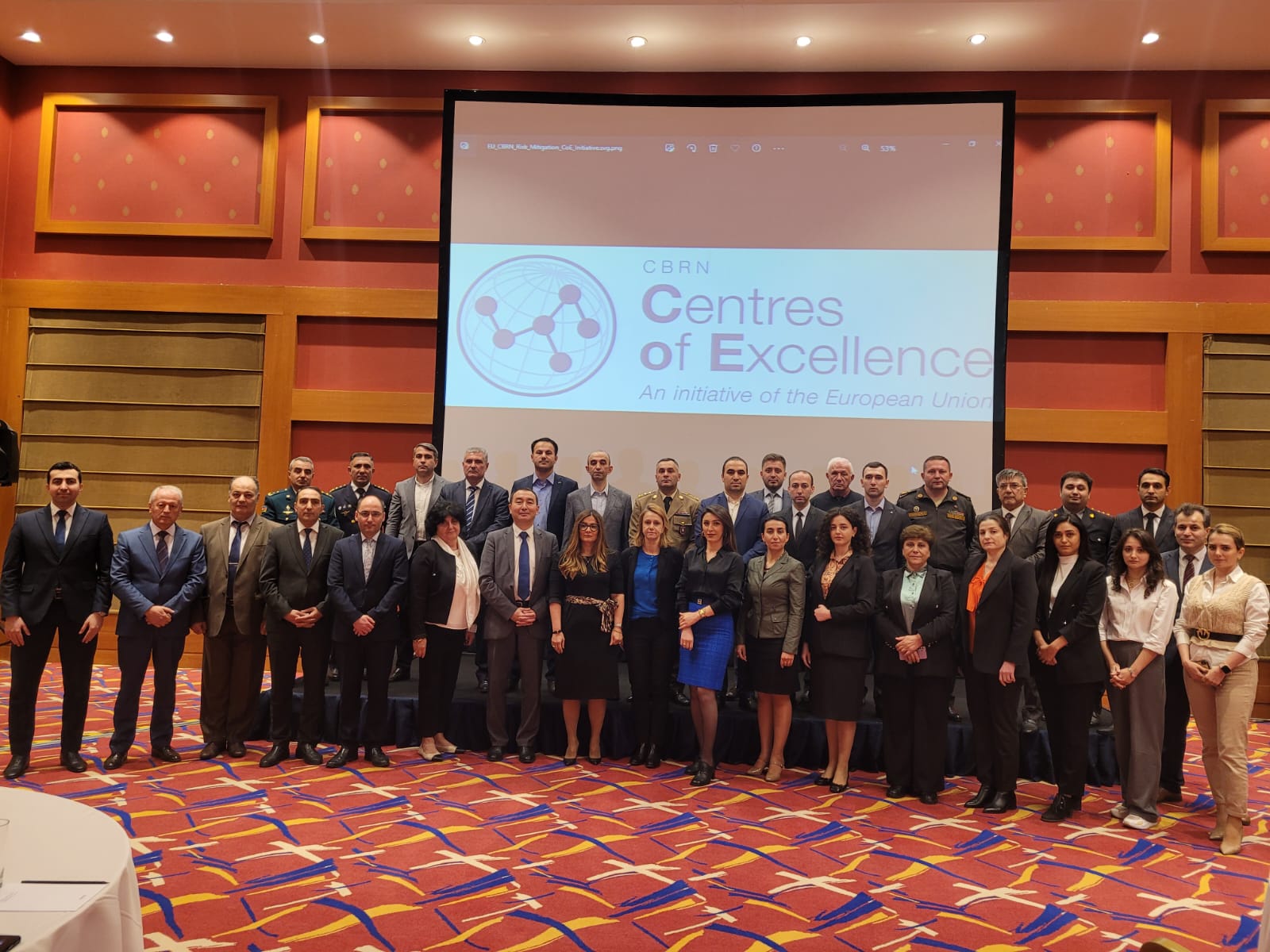
The development of a Chemical, Biological, Radiological, and Nuclear (CBRN) National Action Plan is essential to enable countries to define their priority activities to strengthen their CBRN risk mitigation. This key document guides countries in identifying the specific areas that require immediate attention or strategic planning to effectively address CBRN threats within and across their borders. Prior to the consolidation of the CBRN National Action Plan, national stakeholders are consulted on the current means of prevention, preparedness and response to both natural disasters or man-made attacks involving CBRN materials. The outcome of this consultation provides a comprehensive basis for developing their unique CBRN risk mitigation strategy.
Azerbaijan embarks on journey to develop CBRN National Action Plan
In a significant stride towards enhancing CBRN risk mitigation, Azerbaijan embarked recently on the initial phases of the country’s endeavour towards the development of its CBRN National Action Plan.
Thirty members of Azerbaijan’s CBRN National Team*, tasked with the implementation of the EU CBRN CoE initiative at country level, took part in a three-day workshop (14 – 16 November 2023) hosted in Baku to complete the CBRN needs assessment questionnaire that defines the basis of the country’s future CBRN National Action Plan. Composed of 300 questions, this comprehensive questionnaire addresses various areas of CBRN safety and security according to a methodology developed by the European Commission.
Based on the results of the workshop, Azerbaijan’s CBRN National Team will be able to identify and focus on the main priority areas that should be incorporated in the country’s CBRN National Action Plan. The strategic document will eventually be submitted for approval to the government, demonstrating Azerbaijan's dedication to addressing CBRN threats with a comprehensive and government-endorsed strategy.
The foundational steps of Azerbaijan in its journey to develop and approve a CBRN National Action Plan are proof to the country’s proactive approach to implement international best practices and standards to mitigate the risks associated with CBRN materials. This pioneering effort sets the stage for future collaboration and advancements in CBRN national preparedness, reflecting Azerbaijan's commitment not only to safeguarding its citizens, environment and economy, but also contributing to making the South East and Eastern Europe region and the world a more secure place.

Joint efforts to advance CBRN risk mitigation in the South East and Eastern Europe region
Azerbaijan joined the EU CBRN Centres of Excellence in 2017 as a partner country of the Initiative’s Regional Secretariat for the South East and Eastern Europe region, standing as the youngest member in this 10-country regional network of cooperation. Irrespective of this short period of membership, Azerbaijan has made significant progress towards CBRN risk mitigation within the framework of the EU CBRN CoE.
The completion of the CBRN needs assessment questionnaire was achieved through joint efforts of Azerbaijan’s CBRN National Team, under the coordination of the CBRN National Focal Point Mr. Jeyhun Isgandarli, and the close cooperation of the European Commission’s Joint Research Centre (JRC), the South East and Eastern Europe Regional Secretariat, the United Nations Interregional Crime and Justice Research Institute (UNICRI), and the On-Site Technical Assistance network.
The 300 questions comprising the CBRN needs assessment questionnaire examine the following nine sections: Legislation and Regulations, State CBRN Managing Authorities, Risk Mitigation Strategy, CBRN Prevention Measures, Detection of CBRN Materials, Preparedness and Response, CBRN Recovery Measures, Sustainability, and Strategic Trade Control.
* The thirty members of Azerbaijan’s CBRN National Team that participated in this workshop represent the following government bodies: Ministry of Health, Ministry of Defense, General Prosecutor’s Office, Ministry of Internal Affairs, Ministry of Ecology and Natural Resources, Ministry of Agriculture, State Customs Committee, Nuclear Research Department of Innovation and Digital Development Agency of Ministry of Digital Development and Transport, Food Safety Agency, State Border Service, Republican Center of Hygiene and Epidemiology, Institute of Microbiology of Ministry of Science and Education, TABIB (Administration of the Regional Medical Divisions) and Ministry of Emergency Situations and its structural components: Civil Defense Troops (MES), “Isotope” Special Facility (MES), State Agency for Regulation of Nuclear & Radiological Activity (MES), Department on Elimination of Consequences of Emergencies (MES), Medical Emergency Service (MES), and State Fire Protection Service (MES).
Details
- Publication date
- 22 November 2023
- Authors
- Service for Foreign Policy Instruments | Joint Research Centre
- CBRN areas
- Bio-safety/bio-security
- Border control and monitoring
- Crisis management
- Denying support for misuse and terrorism
- First response
- Illicit trafficking
- Import/export control
- Investigation and prosecution
- Legal framework
- Post incident recovery
- Protection of material/facilities
- Public and infrastructure protection
- Public health impact mitigation
- Safeguarding information diffusion
- Safety and security
- Transit and trans-shipment control
- Waste management
- CBRN categories
- Chemical
- Biological
- Radiological
- Nuclear
- CoE Region
- SEEE - South East and Eastern Europe
